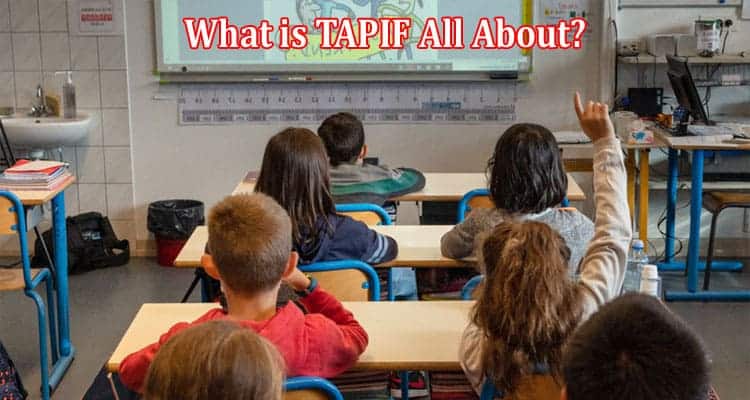Teaching English in France: What is TAPIF All About?
TAPIF, the Teaching Assistant Program in France, is an esteemed opportunity for language enthusiasts to immerse themselves in the vibrant culture of France. Read on to discover what the TAPIF program is all about and what it could mean for you.
What is TAPIF?
TAPIF stands for Teaching Assistant Program in France. The program is an initiative from the French Ministry of Education and the Centre International d’études pédagogiques (CIEP) and collaborates with the French Cultural Services in participating countries.
The goal of the TAPIF program is for international language enthusiasts to serve as language assistants in primary and secondary schools, language centres, and other institutions across France. The program typically lasts for one academic year, from October to April, with the option to extend for an additional year in some cases. Want to know more? Head over here for blog content about the TAPIF Program.
Job Description
Participants’ main job responsibility is assisting primary and secondary English teachers in teaching the English language and culture to French students. In practice this means supporting English language instructions in the classroom and giving students additional opportunities for conversational practice and sharing cultural insights.
An important part of the job is collaboration with the classroom teachers in developing lesson plans and activities and providing teaching materials that integrate English language learning into the lessons. Depending on your language proficiency and teaching experience, responsibilities could include leading language exercises and providing feedback on students’ performances. Language assistants may also assist with English language exams, assessments, or preparation for standardised tests such as the Baccalauréat or English proficiency exams like the TOEFL or Cambridge exams.
More than just an education program
An important aspect of the TAPIF program is that it is more than just an educational program. The main purpose of a language assistant is to help English teachers with the lessons, but the secondary purpose of the program is cultural exchange. Participants act as cultural ambassadors by sharing insights into their own culture, customs, and traditions with students. In doing so, they facilitate cross-cultural exchange between French students and English-speaking countries, as well as promote mutual understanding and friendship.
Eligibility Criteria
First and foremost, only citizens of participating countries are eligible to apply for the program. The age limit of the program is between 20 and 35 years old. Since TAPIF is a language program, participants must be proficient in English. Participants must also have completed at least two years of higher education, although it is not specified in which field.
The Application Process
The application process is done completely online. The online application consists of a personal essay, your academic transcripts, and a letter of recommendation. The letter of recommendation must demonstrate your qualifications, character, and suitability for the role of a language assistant. Teachers, professors, supervisors, or mentors are suitable people to ask for a letter of recommendation.
Where will you end up?
In case the title hasn’t clued you in yet, TAPIF is an educational program that places language assistants in educational institutions across France. The exact placement is based on participants’ preferences, qualifications, language proficiency, and the needs of the individual institutions.
Benefits and Salary
Language assistants earn a monthly stipend of about €800 to €900 as compensation for their work. The exact amount of the stipend depends on the participant’s country of origin and the cost of living in their placement location. As you can imagine, housing in Paris is much more expensive than in a more rural region. Since the TAPIF program covers one academic school year, this also includes paid vacations such as Christmas break and other national holidays.
In addition to the stipend, participants also receive health insurance coverage. The specifics of the health insurance plan may vary depending on the participant’s placement and the terms of their contract.
In some cases, participants might be eligible for housing assistance and/or will have accommodations provided for them by their host institution. Do keep in mind that housing benefits are not guaranteed, and it is just as likely that you’ll be asked to provide your own housing arrangements.
Professional Development
It’s in the program’s best interest that its participants have the best available knowledge and training, which is why the program also offers opportunities for professional development. This includes training sessions, workshops, and networking events with other participants. During these opportunities for professional development, participants can enhance their teaching skills and language proficiency.
By meeting language assistants from other participating countries, you also have the chance to further your intercultural competence. By living and working in France for a full academic year, you benefit from a thorough cultural immersion in the French way of life. During the year, you’ll have plenty of opportunities to explore French culture, learn the French language, sample the local cuisine, and experience some traditions while engaging with the local community.
Challenges and Considerations
The most obvious challenge of the TAPIF program is the language barrier. The French are not known for their English proficiency, and if you have limited proficiency in the French language, you might experience some communication difficulties. Navigating daily interactions, understanding administrative procedures, and communicating effectively with colleagues and students may require additional effort and adaptation.
As with all international exchange programs, there will be some cultural adjustments. Adjusting to a new cultural environment, customs, and social norms can be challenging, particularly for participants from non-French backgrounds. Cultural differences in communication styles, work expectations, and social interactions may require flexibility, open-mindedness, and cultural sensitivity.
Navigating visa requirements, administrative procedures, and bureaucratic processes can be complex and time-consuming. Participants should ensure they have all necessary documentation, meet visa deadlines, and comply with French immigration regulations. Luckily this is something that you’ll only have to go through once.
Conclusion
The TAPIF program offers a unique chance to immerse yourself in French culture while gaining valuable teaching experience. Despite challenges like language barriers and cultural adjustments, the benefits make it a rewarding opportunity for those passionate about language education and cultural exchange. If you’re eager to embark on a transformative journey in France, TAPIF could be the perfect fit.




